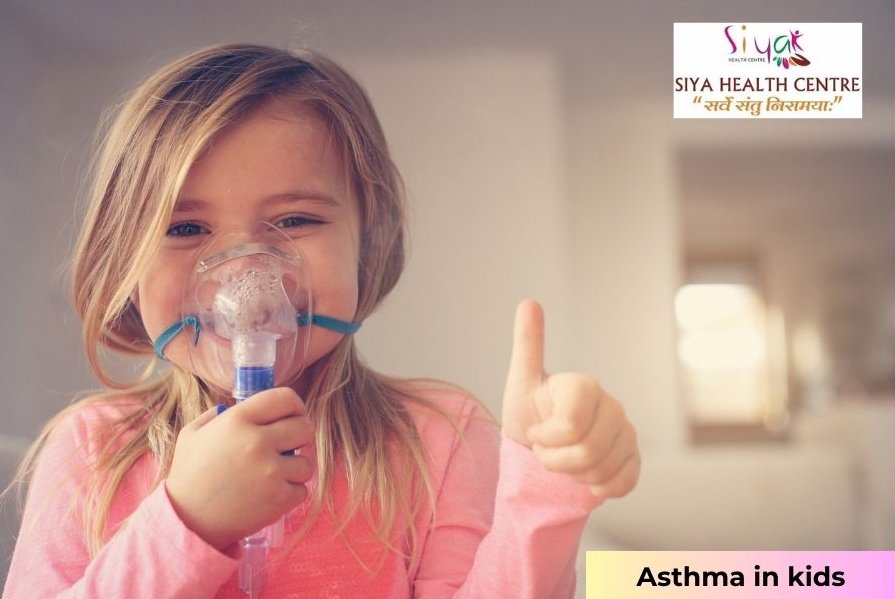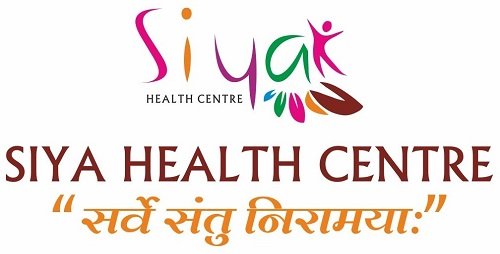Asthma in kids
Best Doctors For Asthma In Children by Dr. Ratnesh Khare, Asthma is a chronic respiratory condition that affects children, causing inflammation and narrowing of the airways. This results in recurrent symptoms such as wheezing, breathlessness, chest tightness, and coughing. These symptoms can vary in frequency and severity, often triggered by allergens like dust mites, pollen, pet dander, or respiratory infections. In children, asthma can disrupt daily activities, affect sleep patterns, and reduce their quality of life.
Dr. Ratnesh Khare, a leading pediatrician at Siya Health Care in Indore, is highly regarded for his expertise in managing childhood asthma. With extensive experience in pediatric respiratory conditions, Dr. Khare provides a compassionate approach to treatment, focusing on accurate diagnosis through lung function tests and allergy assessments.

Siya Health Care provides a supportive environment for families dealing with childhood asthma, offering education on asthma triggers, inhaler techniques, and action plans for managing acute episodes. Dr. Ratnesh Khare and his team collaborate closely with parents and caregivers to empower them with the knowledge and tools needed to optimize their child’s respiratory health and ensure they lead active, fulfilling lives despite asthma challenges.
Book Your Consultation Today Child Specialist in Indore– Dr. Ratnesh Khare
Symptoms of asthma in kids
Wheezing
Wheezing is a frequent symptom in children, marked by high-pitched whistling sounds during breathing. It happens when the airways narrow due to bronchoconstriction and increased mucus production. During physical examinations, Dr. Ratnesh Khare at Siya Health Care listens for wheezing to assess the level of airway obstruction and determine the best course of treatment.
Coughing
Persistent or frequent coughing, especially at night or during physical activity, is another key symptom in children with asthma. This cough can be dry or productive and is often triggered by factors like allergens, cold air, exercise, or respiratory infections. At Siya Health Care, Dr. Ratnesh Khare carefully evaluates the nature and timing of these cough episodes to distinguish asthma-related cough from other respiratory issues, ensuring accurate diagnosis and treatment.
Shortness of Breath
Shortness of breath or difficulty breathing often occurs during asthma flare-ups, as the airways narrow and airflow to the lungs decreases. Children may experience rapid breathing (tachypnea) and signs of respiratory distress during these episodes. At Siya Health Care, Dr. Ratnesh Khare assesses respiratory effort and oxygen saturation levels to gauge the severity of breathing difficulties and decide if immediate intervention is needed.
Chest Tightness
Children with asthma describe a sensation of tightness or discomfort in the chest, which typically accompanies wheezing and difficulty breathing. This feeling arises from inflammation and constriction of the airways, making it harder to fully expand the lungs during breathing. At Siya Health Care, Dr. Ratnesh Khare conducts thorough chest examinations to assess chest wall movement and detect signs of respiratory distress, ensuring prompt and effective treatment.
Fatigue or Reduced Activity Tolerance
Poorly controlled asthma symptoms can result in fatigue, lower energy levels, and restrictions in physical activities. Children may avoid strenuous exercise or active play out of concern that it could trigger symptoms. At Siya Health Care, Dr. Ratnesh Khare addresses these activity limitations as part of asthma management. He encourages balanced physical activity while adjusting asthma medications to support better lung function and improve endurance.
Nighttime Symptoms
Asthma frequently presents with nighttime symptoms like coughing, wheezing, or shortness of breath, which can disrupt sleep and cause restlessness. Dr. Ratnesh Khare focuses on these nocturnal symptoms during asthma evaluations at Siya Health Care, as they signal poor asthma control. If needed, he adjusts medication dosages or treatment plans to better manage symptoms and improve sleep quality for the child.
Dr. Ratnesh Khare's comprehensive approach to diagnosing and managing asthma in children at Siya Health Care focuses on alleviating symptoms, optimizing lung function, and empowering families with education and support. By addressing each child's unique asthma triggers and symptoms, Dr. Khare ensures personalized asthma care that promotes respiratory health and enhances quality of life for young patients in Indore and surrounding communities.
Treatments for asthma in kids
Medication Therapy
Bronchodilators
Quick-relief medications are designed to relax the muscles around the airways, making it easier to breathe during asthma attacks. Short-acting beta-agonists (SABAs), such as albuterol, are among the most commonly used options for providing fast relief from symptoms.
Controller Medications
Long-term medications are taken daily to prevent asthma symptoms and reduce airway inflammation. These include inhaled corticosteroids (ICS), leukotriene modifiers, and long-acting beta-agonists (LABAs). At Siya Health Care, Dr. Ratnesh Khare prescribes these medications based on the child's asthma severity and closely monitors their effectiveness to ensure proper asthma control.
Allergen Management
Identifying and avoiding triggers that have symptoms is essential for effective management. Common allergens, such as dust mites, pet dander, pollen, mold, and tobacco smoke, can significantly contribute to flare-ups. At Siya Health Care, Dr. Ratnesh Khare educates families on strategies to avoid allergens, suggests environmental controls like allergen-proof bedding and clean indoor air, and may refer children for allergy testing if necessary to better tailor their care.
Asthma Action Plan
A written asthma action plan tailored to the child’s specific needs is essential for effective management by parents and caregivers. At Siya Health Care, Dr. Ratnesh Khare develops personalized action plans that outline daily medications, steps to take during asthma exacerbations or attacks, and guidelines for when to seek medical assistance. This plan empowers families to recognize early signs of worsening asthma and take appropriate actions to prevent complications, ensuring better health outcomes for the child.
Education and Support
Dr. Ratnesh Khare and the team at Siya Health Care offer comprehensive education to children and their families about asthma triggers, symptoms, and medication techniques, including proper inhaler use. They also discuss lifestyle modifications that can optimize asthma management. Regular asthma reviews and follow-up visits allow the team to adjust treatment plans based on the child’s response and changing needs, ensuring the best possible care.
Monitoring and Regular Follow-up
Monitoring asthma symptoms, lung function, and medication adherence is crucial for effective management. Dr. Ratnesh Khare conducts regular follow-up visits at Siya Health Care to assess asthma control, review treatment goals, and make necessary adjustments to medications or management strategies. This monitoring process includes evaluating symptoms, measuring peak flow, and identifying any changes in triggers or environmental factors that may impact asthma control.
Emergency Preparedness
Preparation for asthma emergencies is critical for ensuring a child’s safety. Dr. Ratnesh Khare educates families at Siya Health Care on recognizing severe asthma symptoms, such as intense wheezing, difficulty speaking, or chest tightness. He also teaches them how to administer emergency medications, including rescue inhalers and oral corticosteroids, and emphasizes the importance of seeking immediate medical care when necessary. Emergency action plans facilitate quick intervention, helping to reduce the risk of asthma-related complications.
Dr. Ratnesh Khare's comprehensive approach to treating asthma in children at Siya Health Care combines evidence-based medicine with personalized care, aiming to achieve optimal asthma control and enhance the quality of life for young patients in Indore. By focusing on medication adherence, allergen management, education, and proactive monitoring, Dr. Khare and his team empower families to manage asthma effectively and promote long-term respiratory health.
Frequently Asked Questions
Asthma is a chronic respiratory condition characterized by inflammation and narrowing of the airways, leading to recurrent episodes of wheezing, coughing, chest tightness, and shortness of breath. It can affect children of all ages and varies in severity from mild to severe.
Common triggers of asthma in children include allergens such as pollen, dust mites, pet dander, and mold. Other triggers include respiratory infections (like colds or flu), exercise, cold air, strong odors or fumes, and emotional stress.
Diagnosis of asthma in children involves a thorough medical history, physical examination, and lung function tests. Dr. Ratnesh Khare at Siya Health Care may also recommend allergy testing and other diagnostic tests to identify specific triggers and assess lung function.
Symptoms of asthma in children include wheezing (a whistling sound when breathing), coughing (particularly at night or with exercise), shortness of breath, chest tightness, and frequent respiratory infections. Symptoms may vary in intensity and frequency.
Treatment of asthma in children includes medications such as bronchodilators (for quick relief of symptoms) and controller medications (to prevent symptoms and reduce inflammation). Dr. Khare develops personalized asthma management plans at Siya Health Care, which may also include allergen avoidance, asthma action plans, and regular monitoring.
With proper management and treatment, most children with asthma can lead active and normal lives. Dr. Ratnesh Khare emphasizes the importance of medication adherence, asthma education, and environmental control measures to minimize asthma triggers and optimize lung function.
Emergency care for asthma is needed if your child experiences severe symptoms such as extreme difficulty breathing, rapid worsening of symptoms despite medication use, or bluish discoloration around the lips or fingernails. Dr. Khare advises families at Siya Health Care on recognizing these signs and taking prompt action.
Preventing asthma attacks involves identifying and avoiding triggers, ensuring regular use of prescribed medications (both quick-relief and controller medications), maintaining good indoor air quality, and promoting a healthy lifestyle with regular exercise and proper nutrition.

